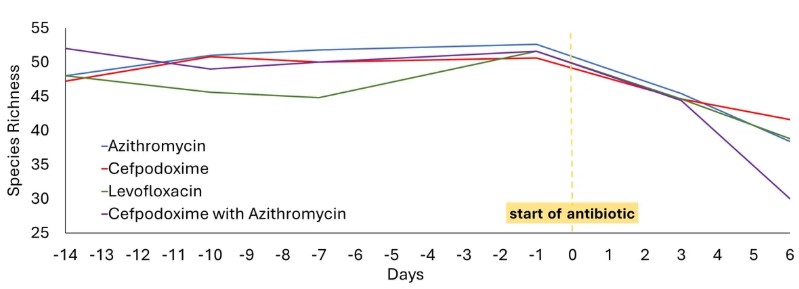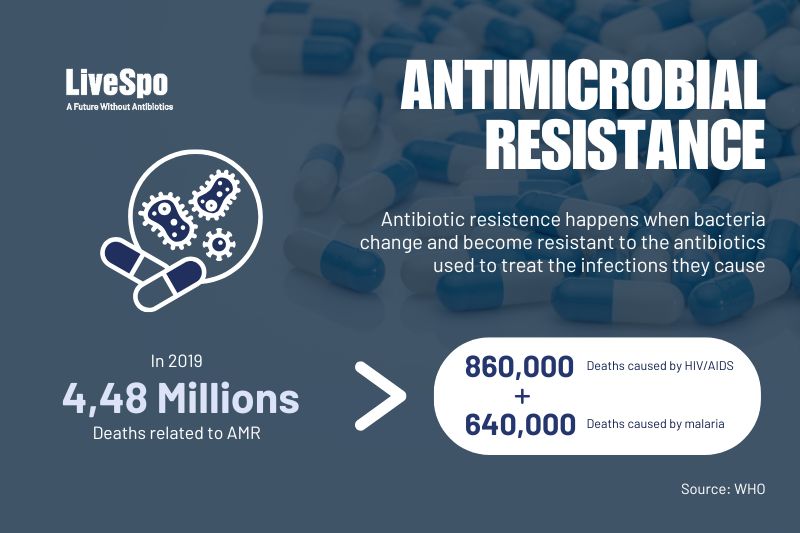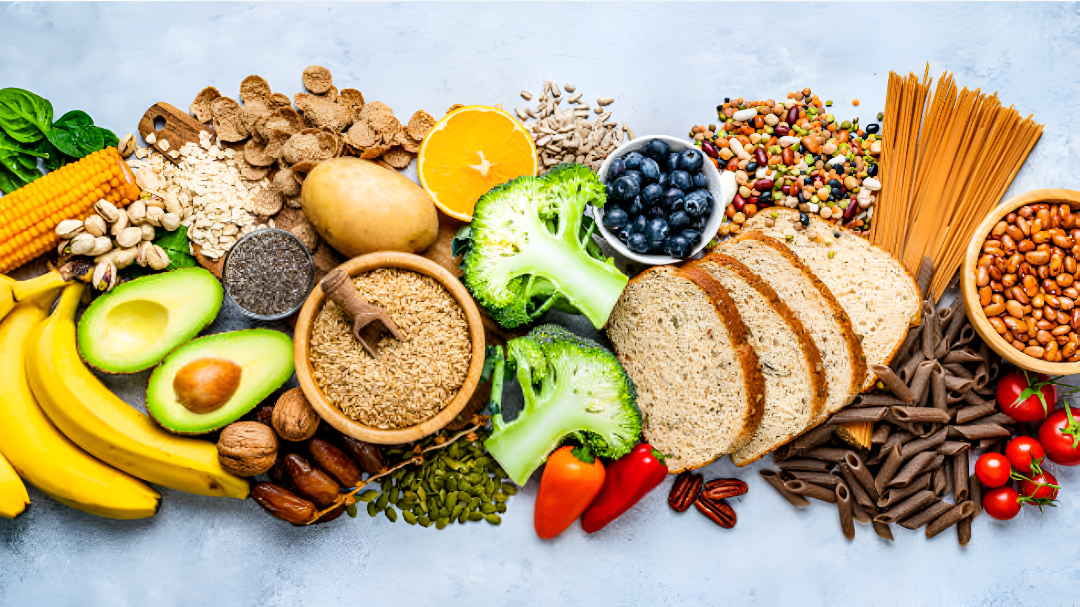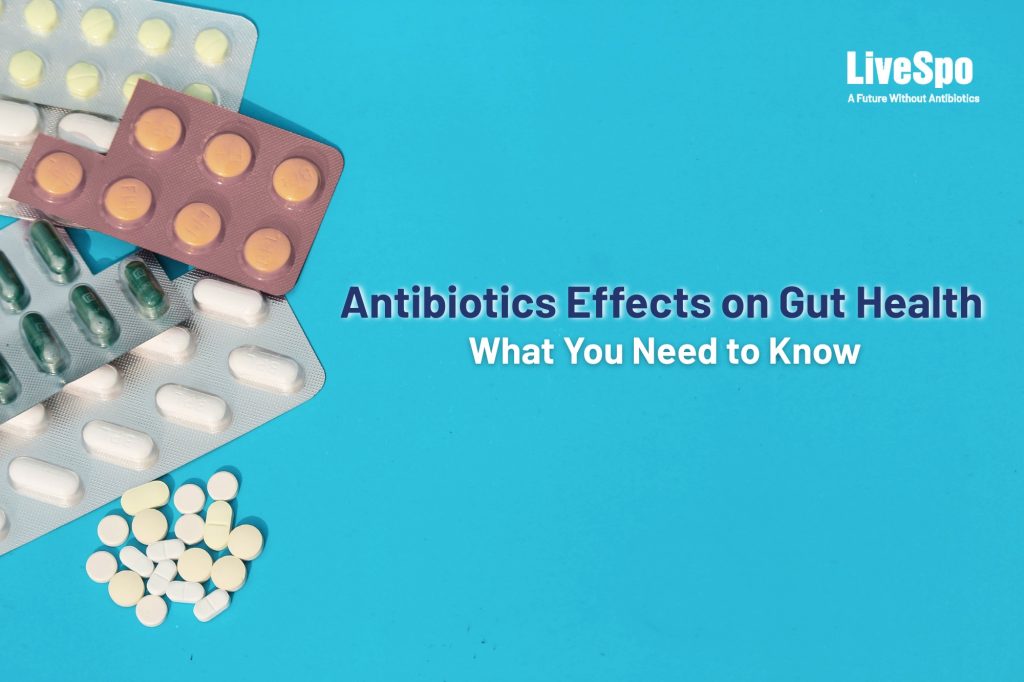Antibiotics Effects on Gut Health: What You Need to Know
For decades, it is undeniable that antibiotics are a staple of modern medicine and save millions of people per year. However, in the process of targeting the infection-causing bacteria, antibiotics can unintentionally wipe out the other good bacteria in our bodies. Common side effects of antibiotics include gastrointestinal issues and recurrent Clostridioides difficile infections. In the long term, patients can experience the development of allergy, immunological, metabolic or inflammatory illnesses.
Antibiotics effects on gut microbiome
Antibiotics are a type of drug used to treat bacterial infections by either stopping infection or preventing bacteria from multiplying. Some may kill a wide range of bacteria (broad-spectrum), whereas others will only target a few species of bacteria (narrow-spectrum). As a result, antibiotic effects on gut microbiome can be significant since doctors often recommend broad-spectrum antibiotics as the bacterium causing an infection is usually unknown.
In a recent study published in Cell Reports, researchers recruited 20 healthy adults and divided them into four groups. Each group received a different antibiotic—or a combination—for five days. The selected drugs (levofloxacin, azithromycin, cefpodoxime, and a mix of azithromycin and cefpodoxime) are commonly prescribed for people with pneumonia, even though it’s often caused by viruses.
To track changes in the gut, the team collected fecal samples before, during, and after the antibiotic course, with the final sample taken six months later. These samples were analyzed to monitor shifts in bacterial diversity and the presence of resistance genes.

When healthy volunteers took antibiotics, researchers observed a sharp decline in the diversity of microbes in their gut. Both the total number of species and the number of culturable species dropped significantly right after treatment. While most participants’ gut diversity returned to pre-treatment levels within two months, the actual microbial composition remained changed. These findings show that antibiotics don’t just cause temporary changes—they fundamentally restructure the microbiome.
Common Side Effects of Antibiotics To Gut
Antibiotics are essential for treating bacterial infections but can lead to several gastrointestinal side effects due to their impact on the gut microbiota.
Here are some common antibiotics effects on gut you might experience:
- Diarrhea: Antibiotics can throw off the balance of your gut microbiome, leading to loose, watery stools. Sometimes this happens right after starting a course; other times, it shows up weeks later. Based on a recent study, diarrhea occurs in around 10% of people treated with amoxicillin-clavulanic acid.
- Bloating and Gas: When good bacteria are wiped out, it gives unwanted microbes a chance to grow. These imbalances can cause fermentation in your gut, leading to uncomfortable bloating, cramping, and excess gas.
- Digestive health: Antibiotic usage links to an increasing number of digestive issues such as gastrointestinal infections, inflammatory bowel disease (IBD) and colorectal cancer. In another study in 2010 of Danish children found that children are more likely to develop IBD in the first 3 months of taking antibiotics.
- Yeast Overgrowth (Candida): Without enough good bacteria to keep the yeast at bay, Candida yeast can multiply, causing the symptoms of a yeast infection.
- Clostridioides difficile: This is a dangerous type of bacteria that lives in the intestines. Usually, other microbes can keep C. diff under control but antibiotics can allow the bacteria to thrive. This can lead to antibiotic-associated diarrhea, which can pose a serious risk to a person’s life.

Should You Avoid Antibiotics?
Absolutely not. When used properly, antibiotics are life-saving. The problem is overuse and misuse. According to the World Health Organization, overuse and misuse of antibiotics contribute to rising antimicrobial resistance – a global health threat.
Here are some common mistakes:
- Taking antibiotics for viral infections like colds and flu
- Not finishing the full course
- Using leftover antibiotics without a prescription
Always follow your doctor’s advice. But if antibiotics are necessary, there are ways to support your gut along the way.

Restoring Gut Health After Antibiotic Use
Antibiotics can disrupt the balance of bacteria in your gut, leaving us feeling uncomfortable or unwell. Here are some practical ways that can help minimize these effects.
Take probiotics
Research shows that taking probiotics during or after antibiotic treatment may help maintain the gut’s bacterial diversity and reduce the presence of antibiotic-resistant genes (ARGs), offering some protection against antibiotic resistance.
However, because probiotics are usually bacteria themselves, they can also be killed when taking broad spectrum antibiotics simultaneously. So, it is recommended to wait 4-6 hours after an antibiotic dose before taking probiotics.
You should also look for spore-forming strains like Bacillus subtilis or Bacillus clausii, which are highly resistant to stomach acid and heat. There are multiple clinical studies that show they deliver higher survivability than traditional probiotics and can reduce persistent diarrhea, especially in children.
Eat fermented foods
Adding fermented foods to your diet is another effective way to restore gut health after antibiotics. Foods like yogurt, sauerkraut, cheese, kombucha, and kimchi are rich in beneficial bacteria, particularly Lactobacilli, which can help rebuild your gut microbiota. Including these foods regularly can support a healthier gut environment after using antibiotics.
Eat high fiber foods
Eating high-fiber foods after completing your antibiotic course may help restore a healthy bacterial balance. A 2022 study even showed that daily intake of soluble fiber could reduce the number of ARGs in the gut. Therefore, it’s best to consume high-fiber foods after finishing antibiotics, as fiber might reduce the antibiotics absorption if taken simultaneously.

Eat prebiotic foods
While many prebiotics are high in fiber, some aren’t – like red wine and cocoa. These contain antioxidant compounds called polyphenols that also support gut bacteria, especially Bifidobacteria. Our bodies can’t digest these compounds, but gut bacteria can, which helps them thrive. Eating prebiotic-rich foods, especially after taking antibiotics can help restore and strengthen your gut microbiome.
Final Thoughts
Antibiotics effects on gut health can be profound, but they are not entirely negative. Understanding their impact doesn’t mean you should avoid antibiotics, but it does mean you should take them mindfully and take steps to protect and restore your gut when needed. With the right support, you can help your gut recover and continue to thrive after antibiotic use.
If you’re looking for a reliable way to protect your gut during or after antibiotic treatment, LiveSpo provides a variety of liquid spore probiotics products backed by clinical trials. Our spore-based strains like Bacillus subtilis, Bacillus clausii and Bacillus coagulans are designed to survive stomach acid and heat, making them ideal for use alongside antibiotics.
With a 95% survival rate in the stomach and high-standard production, LiveSpo probiotics help restore microbial balance, support immunity, and reduce the risk of antibiotic-associated digestive issues. Learn more about how LiveSpo can support your gut here.





